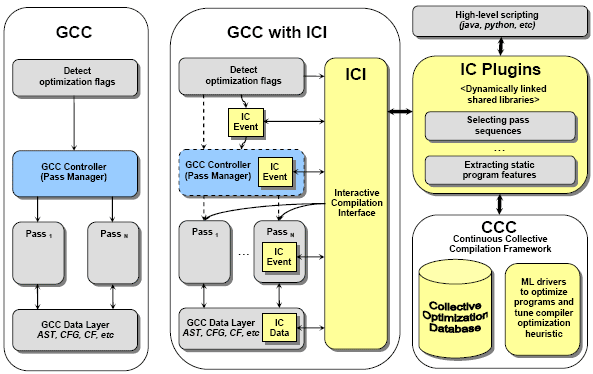From cTuning.org
| Line 32: | Line 32: | ||
| | | | ||
{{News1| | {{News1| | ||
| + | |||
| + | *'''2009.September.1''' - The documentation of [http://ctuning.org/milepost-gcc MILEPOST GCC]/[http://ctuning.org/ici GCC ICI] extensions by Yuanjie and Liang during GSOC'09 program is now available: [http://ctuning.org/wiki/index.php/CTools:ICI:Projects:GSOC09:Function_cloning_and_program_instrumentation Function cloning and program instrumentation] and [http://ctuning.org/wiki/index.php/CTools:ICI:Projects:GSOC09:Fine_grain_tuning Fine grain program tuning]. We would like to fully test and sync these developments with mainline GCC within next month or two. | ||
*'''2009.August.05''' - The colleagues from the [http://unidapt.org UNIDAPT Group] started investigating the use of [http://ctuning.org cTuning]/[http://www.milepost.eu MILEPOST] technology and the [http://ctuning.org/unidapt UNIDAPT framework] to predict good optimization and parallelization schemes for hybrid heterogeneous CPU/GPU-like architectures together with [http://www.caps-entreprise.com CAPS Entreprise] based on run-time adaptation and profiling, empirical iterative compilation, statistical analysis, machine learning, program and dataset features and run-time decision trees ({{Ref|FT2009}}, {{Ref|LCWP2009}}, {{Ref|Fur2009}}, {{Ref|JGVP2009}}, {{Ref1|TWFP2009}}, {{Ref|FMTP2008}}, {{Ref|LFF2007}}, {{Ref|FCOP2005}}). They plan to add new optimization cases to the [http://ctuning.org/cdatabase Collective Optimization Database] in Autumn, 2009. | *'''2009.August.05''' - The colleagues from the [http://unidapt.org UNIDAPT Group] started investigating the use of [http://ctuning.org cTuning]/[http://www.milepost.eu MILEPOST] technology and the [http://ctuning.org/unidapt UNIDAPT framework] to predict good optimization and parallelization schemes for hybrid heterogeneous CPU/GPU-like architectures together with [http://www.caps-entreprise.com CAPS Entreprise] based on run-time adaptation and profiling, empirical iterative compilation, statistical analysis, machine learning, program and dataset features and run-time decision trees ({{Ref|FT2009}}, {{Ref|LCWP2009}}, {{Ref|Fur2009}}, {{Ref|JGVP2009}}, {{Ref1|TWFP2009}}, {{Ref|FMTP2008}}, {{Ref|LFF2007}}, {{Ref|FCOP2005}}). They plan to add new optimization cases to the [http://ctuning.org/cdatabase Collective Optimization Database] in Autumn, 2009. | ||
Revision as of 13:12, 2 September 2009
 |
Interactive Compilation Interface |
| Enabling Collaborative Interactive Research Compilers |
|
Navigation: cTuning.org > CTools The Interactive Compilation Interface (or 'ICI' for short) is a plugin system with a high-level compiler-independent and low-level compiler-dependent API to transform current compilers into collaborative open modular interactive toolsets. The ICI framework acts as a "middleware" interface between the compiler and the user-definable plugins. It opens up and reuses the production-quality compiler infrastructure to enable program analysis and instrumentation, fine-grain program optimizations, simple prototyping of new development and research ideas while avoiding building new compilation tools from scratch. For example, it is used in MILEPOST GCC to automate compiler and architecture design and program optimizations based on statistical analysis and machine learning. It should enable universal self-tuning compilers adaptable to heterogeneous, reconfigurable, multi-core architectures ranging from supercomputers to embedded systems.
 ICI is an open collaborative community-driven project. You are welcome to join and participate in developments, discussions, provide feedback or suggestions to extend ICI or add new features. We develop ICI for GCC at the moment, but trying to keep it compiler independent in case someone would like to port it to other compilers to extend collaborative tools. |
|
| ICI supporters: |
             
You are welcome to register your interest at this page. |